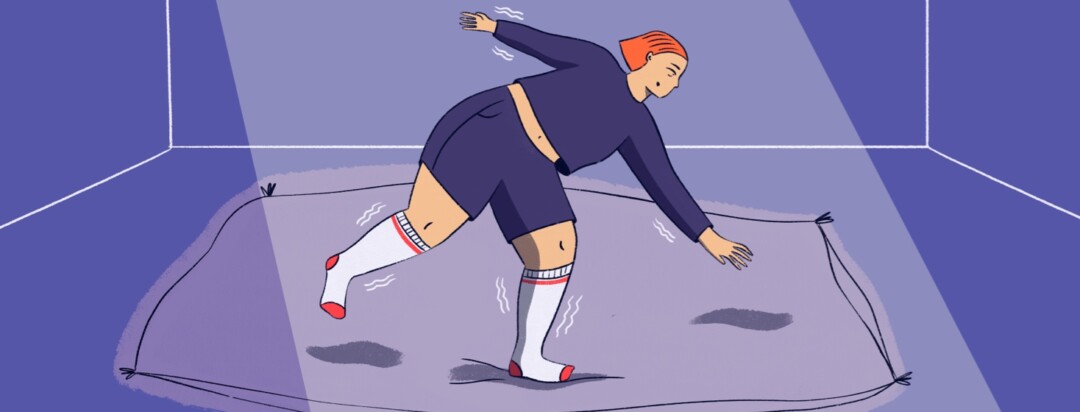Timber! MS, Balance, Trips, and Falls
Is it just me, or does it feel like the fall after that frantic and wobbly “I’m losing my balance dance” happens in slow motion? Not really slow enough to do anything about it but slow enough to clearly think, “Aw man, this is going to suck,” before finally touching down.
Yet, afterward, it seems like it happened in less than a second. I hate this feeling. Unfortunately, this has become much more common for me in the last couple of years. For the longest time I was definitely in denial. But after a few crash landings and many heart-attack-inducing close calls, I’ve finally been able to admit to myself that I am in fact, oftentimes, most definitely, a fall risk.
MS and poor balance
Before I go on I just need to say, I don’t want how I make light of this topic to mislead anyone into thinking that this is not a serious issue. While a fall might seem like no big deal to some people, it can easily lead to serious injury. I’ve always tried to find humor in a lot of the situations I find myself in, even the serious ones, but that’s definitely not because I’m cavalier about it all. I guess this is just how I’ve always tried to face my challenges in life.
For many people, MS can lead to poor balance but not always for the same reasons. MS can damage the various systems involved in balance such as vision, proprioception, and the vestibular system.1 Or maybe MS causes you vertigo? Or maybe it has damaged just the right spot in your cerebellum and/or spinal cord?
Regardless of why it happens, it happens. And for the sake of this post, that’s all that matters. People with MS can have poor balance. Like any other MS symptom, the severity of one person’s poor balance can be vastly different from the severity of another’s.
I was in denial at first
MS started affecting my balance very early on, but it was pretty intermittent at first, usually affecting me only during flairs. As time went on I experienced more and more relapses that left me with a little more long-term disability. Even though I knew that my balance was objectively getting worse, I just couldn’t admit to myself that I had reached that point, even though I had started using a cane years before.
Whenever I had a neurology appointment, I would be given a symptom assessment form to fill out while I sat in the waiting room. “In the last seven days, how many times…” and, “on a scale of 1-10, how would you rate…” You know the one. Whenever it asked me about falls I would always hesitate, unsure of how to answer.
I would immediately start splitting hairs, asking myself, “What even is considered a fall? If I land on something soft, does it even count?” I would tell myself, even others, that, “I wouldn’t consider it a fall, it was more of a… controlled emergency landing like when Captain Sully landed that plane in the Hudson. Inconvenient sure, but for the most part no serious injury.”
I had to acknowledge the truth
Moving a bit forward in time, these sudden encounters with the ground became more common. While I didn’t like to admit it, I started walking away from these little incidents with somewhat painful souvenirs.
One of my first undeniable falls happened when I was simply standing on the front porch one morning looking out at the yard. Nothing exciting, I was just standing there one moment and falling backward like a stiff board the next. I didn’t even do my signature ataxic dance first, I just… fell backward. Right into a bush with a large pokey branch I had sawed off earlier. Then I landed on my side in a muddy planter full of water from a broken sprinkler.
Falling can really hurt
More recently, I was in my “home gym” (AKA the corner of my home office) leaning over my rowing machine trying to plug a light in. I don’t know how it happened, but this time it’s like the world around me started rolling forward and I started falling face-first toward the ground. I reached my hand out to brace myself, but somehow my thumb caught the rowing machine and I landed on it (my thumb) with almost all my weight.
As I fell a full 24 inches forward, and time seemed to slow down, all I could think was, “Aw man, I’m definitely going to break my thumb.” Luckily I didn’t, but weeks later, as I sit here and type, it’s still pretty sore.
What I hope you take away from this
Years ago, when I first started having vestibular and balance issues, I started going to physical therapy. I even saw a vestibular specialist at one point to try to pinpoint the source of my new balance problem and hopefully find a way to improve it. After a while, for whatever reason, I seemed to have just given up, and I stopped doing all my balance exercises.
Now I feel nothing but regret when I think about this. I can’t help but wonder if I would be where I am today had I kept up with my exercises. If I hadn’t spent so much time denying that things were slowly getting worse. Maybe this would have happened regardless but… what if? So whether it’s your balance or some other symptom, I would say don't play the denial game. Act on it when you can, however you can.
What about you? How has MS impacted your balance? Do you ever find yourself sitting there minding your own business when out of nowhere the world seems to shift on its axis, causing you to fall to the side? How do you deal with your balance-related symptoms? Share in the comments below!

Join the conversation